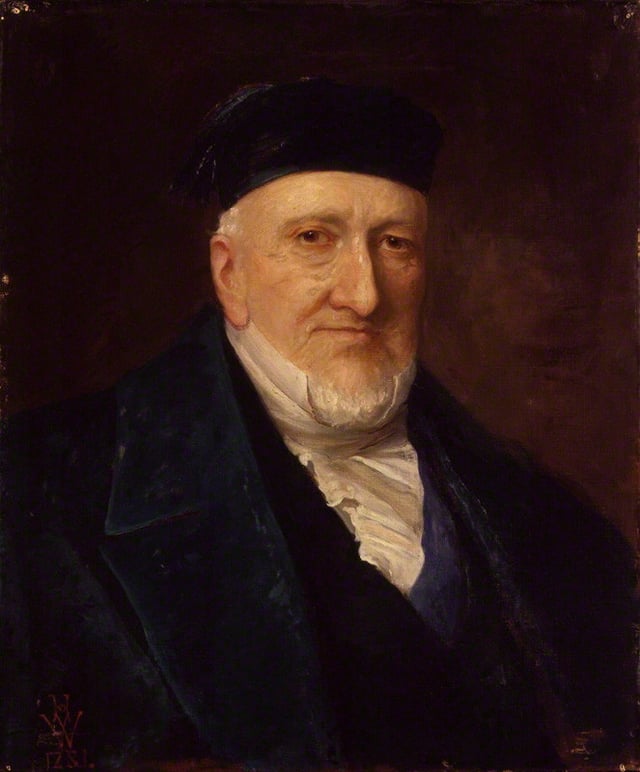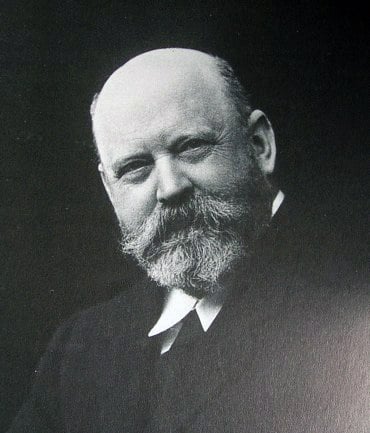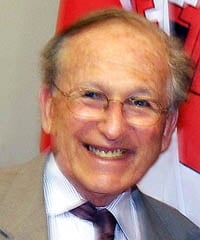Board of Deputies of British Jews

Board of Deputies of British Jews
The Board of Deputies of British Jews, commonly referred to as the Board of Deputies, is the main representative body of the British Jewish community. Established in 1760, the Board has since become a widely recognised forum for the views of the different sectors of the UK Jewish community. Its current president is Marie van der Zyl.
History
The Board of Deputies of British Jews was established in London in 1760, when seven Deputies were appointed by the elders of the Sephardi congregation of Spanish and Portuguese Jews to form a standing committee and pay homage to George III on his accession to the throne.[2] Shortly thereafter the Ashkenazi Jewish congregation from Central and Eastern Europe similarly appointed their own "Secret Committee for Public Affairs" to deal with any urgent political matters that might arise,[3] and safeguard the interests of British Jews as a religious community, both in the British Isles, and in the colonies.[4] They soon began to meet together as occasions arose, and then on a more frequent basis; by the 1810s they appear to have united as one body.[5] It was named the London Committee of Deputies of British Jews.
In the mid 18th century, the body was dominated by Moses Montefiore, the Sephardi lay leader of British Jewry, and Nathan Adler, the Ashkenazi Chief Rabbi. It adopted its current name in 1913. During its history, some of the major divisions in opinion have been between Sephardi and Ashkenazi and between religious and lay leaders.[6]
Members and organisation
The Board is led by Marie van der Zyl, who succeeded Jonathan Arkush as President in June 2018.[7]
The chief executive of the Board is Gillian Merron, who represented Labour as Member of Parliament (MP) for Lincoln from 1997 to 2010. From 2009 to 2010 she was Minister of State with responsibility for Public Health at the Department of Health. She leads a team of professional staff including Director of Public Affairs Philip Rosenberg (formerly of Faiths Forum for London).
The Board comprises Deputies elected by affiliated individual synagogues, confederations of synagogues, and other organisations within the Jewish community such as charities and youth groups. It serves as the principal reference point for government, the media and wider society. All matters tending to impact on the life of Jews in Britain fall within the Board's remit, including an active interfaith programme. Some Jews unaffiliated to synagogues have complained that the board asserts that it also speaks on their behalf despite them being unrepresented on the board. Haredi synagogues have chosen not to affiliate. In 2012, it was noted that nearly two thirds of the deputies were over 60 years of age.[8]
The Board of Deputies offices are co-located with the United Jewish Israel Appeal in Kentish Town.
The Board is the British affiliate of the World Jewish Congress (WJC), the world-wide umbrella organisation of Jewish communities and is the UK member of the European Jewish Congress (EJC).
In January 2019, the Jewish Leadership Council (JLC) reiterated its call for a “unified communal structure” with the Board of Deputies. A previous merger proposal was rejected in 2015 after Deputies felt that they would be relegated to second-rate status. In response to the later call, Marie van der Zyl said that "the representative body that speaks for the community must have the legitimacy and accountability that comes from being broad based, democratic and elected." Deputies have in the past noted that, while Board honorary officers are accountable to deputies, who themselves are accountable to their constituencies, the JLC had no such governance structure.[9]
Past presidents

Moses Montefiore and his family members dominated the presidency of the Board of Deputies during the 19th century. Sephardic Jews were prominent early on.

Walter Rothschild was a president of the Board of Deputies during the early 20th century. The Balfour Declaration was addressed to him.

Greville Janner was a president of the Board of Deputies during the late 20th century. He was also an MP, a member of the House of Lords and a leader of other Jewish organisations.
The most historically notable and longest-serving past president was the Victorian-era banker Moses Montefiore, who in the nineteenth century travelled widely to assist Jewish communities in foreign countries, faced by persecution at the time. A complete list of presidents and interim positions is as follows:[2]
18th century
Benjamin Mendes Da Costa (1760)
Joseph Salvador (1766)
Joseph Salvador (1778)
Moses Isaac Levy (1789)
19th century
Naphtaly Bazevy (1801)
no record (1802–1812)
Raphael Brandon (1812)
Moses Lindo (1817–1829)
Moses Mocatta (1829–1835)
Sir Moses Montefiore (1835–1838)
David Salmons (1838 October–November)
I.Q. Henriques (1838–1840)
Moses Montefiore (1840 May–July)
Hananel De Castro (1840–1841)
Moses Montefiore (1841–1846)
David Salomons (1846 March–August)
Moses Montefiore (1846–1855)
Isaac Foligno (1855 April–December)
Moses Montefiore (1855–1857)
Isaac Foligno (1855 February–September)
Moses Montefiore (1857–1862)
Joseph Meyer Montefiore (1862–1868)
Moses Montefiore (1868 June–November)
Joseph Meyer Montefiore (1868–1871)
Moses Montefiore (1871–1874)
Joseph Meyer Montefiore (1874–1880)
Arthur Cohen (1880–1895)
Joseph Sebag Montefiore (1895–1903)
20th century
David Lindo Alexander (1903–1917)
Stuart Samuel (1917–1922)
Henry Henriques (1922–1925)
Lord Rothschild (1925–1926)
Sir Osmond d'Avigdor-Goldsmid (1926–1933)
Neville Laski (1933–1939)
Selig Brodetsky (1940–1949)
A. Cohen (1949–1955)
Barnett Janner (1955–1964)
Soloman Teff (1964–1967)
Michael Fidler (1967–1973)
Samuel Fisher, Baron Fisher of Camden (1973–1979)
Greville Janner, QC (1979–1985)
Lionel Kopelowitz (1985–1991)
Israel Finestein (1991–1994)
Eldred Tabachnik, QC[10] (1994–2000)
21st century
Issues
The issues which the Board states it addresses are:
Antisemitism & Extremism
Israel & the Middle East
Education
Religious Freedoms & Inequalities
Interfaith & Social Action
International Advocacy[12]
Events
In 2003, the Board, on its website, reproduced an extract from a US State Department report that suggested that the aid organisation Palestinian Relief and Development Fund (Interpal) was helping to fund terrorist organisations. Interpal threatened to sue for libel, whereupon the Board retracted and apologised for its comments.[13][14]
In the same year the Jewish Leadership Council, which says it "brings together the major British Jewish organisations to work for the good of the British Jewish community", was founded.
In 2005, after the Mayor of London, Ken Livingstone, compared a Jewish Evening Standard reporter, Oliver Finegold, to a concentration camp guard, the Board, along with the Commission for Racial Equality, filed an ultimately unsuccessful complaint to the Standards Board for England, calling on Livingstone to apologise. Livingstone responded by stating "there is no law against 'unnecessary insensitivity' or even 'offensiveness' to journalists harassing you as you try to go home" and that he had a "25-year running battle" with the paper's owners.[15][16] In 2006, the London Jewish Forum, designed to act as an interface between the Jewish community and the Mayor's office, was launched by leading London Jews.[17]
In 2014, at the height of the Israeli military operation in Gaza, the Board received widespread criticism in the Jewish community for a joint statement issued with the Muslim Council of Britain (MCB) condemning antisemitism and Islamophobia.[18][19] The statement with its slogan ‘to export peace rather than import conflict’ proved controversial among some on the conservative wing of the Jewish community but was supported by others on the progressive wing and by groups in inter faith circles.[20] The principle of such a statement was approved by the Board by a majority of over 75% at a meeting of the Board on 21 September 2014. In December 2015, the new leadership of the Board distanced itself from the MCB over the latter’s alleged links to the Islamist Muslim Brotherhood.[21]
In 2018, by contrast, over five hundred British Jews signed a letter from Yachad saying that the Board had "deeply misrepresented" their views after the Board criticised Hamas for “repeated violent attempts at mass invasion” but did not call for Israeli restraint or acknowledge that the IDF may have acted disproportionately in killing scores of Palestinians. Liberal Judaism said that “the Board’s credibility as the voice of British Jewry depends wholly on its willingness to listen to, hear from and reflect the values of all sections of the community”.[22]
In July 2018, the Board of Deputies suspended Roslyn Pine, deputy for Finchley United Synagogue, for six years, following comments she made which were described as Islamophobic, and for admitting to holding anti-Arab views.[23]
Scotland
After Scottish devolution in 1999, the Scottish Council of Jewish Communities was formed to give the Jewish Community of Scotland a single democratically accountable voice in dealings with the Scottish Parliament and Executive, other communities, and other statutory and official bodies. The intention when it was established was for it to stand in the same relationship to the Scottish Government as the Board of Deputies of British Jews does to the UK Government. Consequently, the Council is autonomous in matters devolved by the Scotland Act, such as justice, health and welfare, and community relations, whilst the Board of Deputies speaks for all Britain's Jews on reserved matters such as foreign affairs and equality legislation.
See also
History of the Jews in England
Presbyter Judaeorum
British Jews
European Jewish Congress
World Jewish Congress
Anglo-Jewish Association
League of British Jews